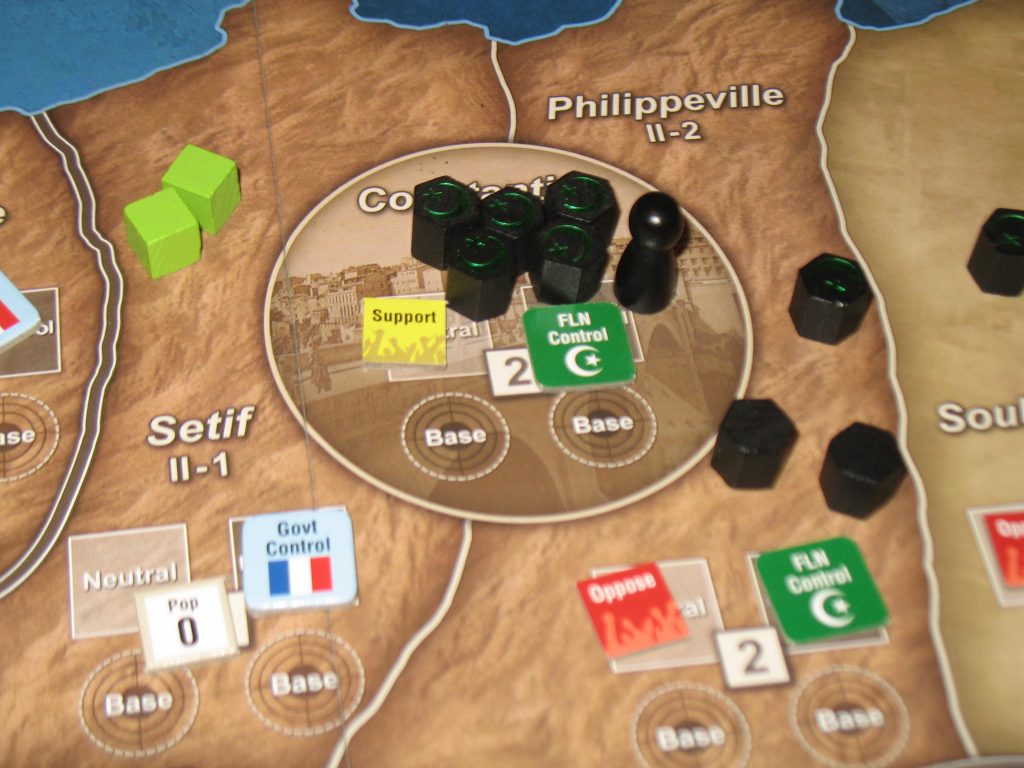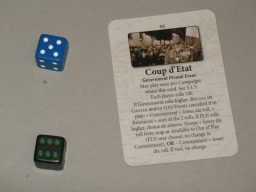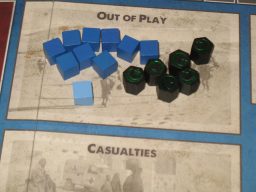 This was our first game so we were overwhelmed by the number of options at the beginning.
This was our first game so we were overwhelmed by the number of options at the beginning.
The sixth event to come out was a propaganda card, so those opening turns mostly involved us trading “Op + Special” moves with very little impact on the relative scores. In this phase, we behaved as if resources were effectively infinite. France lucked up by drawing Napalm for the second card; they chose to take the event on that and ended up with the benefit of a powerful capability for the entire game. (Their assaults in mountain regions were tremendously effective because of this. They could clean out guerrillas there with only half the usual number of troops.)
It wasn’t until the nineteenth card of the second round that the next propaganda card emerged. Both of us ran out out of resources during this round, so things picked up due to each of us playing Passes and Events more. The dilemmas of just what to do were as challenging as ever, however. The FLN used a Limited Op March followed by a Rally to move his fighters from Tunisia into Souk Aras. There was a great deal of back and forth there while French troops cleared out an FLN base in Tizi Ouzou. On the other side of the country, the FLN managed to subvert Algerian police units in the city of Oran and then Rally there until they could build a base and take complete control there.
 For the final round, things got really crazy. On the second card to come out, the French took the Coup d’Etat event. They rolled a five while the FLN rolled six… which allowed the FLN to take five French troops from the board, placing them in the out of play box. Somehow, the FLN managed to play the Oil & Gas Discoveries events on the very next card. (There had to be some kind of error on France’s player that allowed this. Maybe he didn’t take a Limited Op when he should have…?) Anyway, four more French troops were removed from the board and placed in the out of play box. Incredibly, the French did not have any French troops on the board now!
For the final round, things got really crazy. On the second card to come out, the French took the Coup d’Etat event. They rolled a five while the FLN rolled six… which allowed the FLN to take five French troops from the board, placing them in the out of play box. Somehow, the FLN managed to play the Oil & Gas Discoveries events on the very next card. (There had to be some kind of error on France’s player that allowed this. Maybe he didn’t take a Limited Op when he should have…?) Anyway, four more French troops were removed from the board and placed in the out of play box. Incredibly, the French did not have any French troops on the board now!
Things got extremely bloody at this point. Without the threat of a French Troop Lift and Sweep combination, the FLN could expose their guerrillas without having to worry about getting wiped out. The FLN launched multiple attacks in Tlemcen, Constantine, and Philippeville, completely wiping out the police units and bases in those locations. In response, an embittered French player took the Atrocities and Reprisals event, eliminating opposition in Mostaganem and Orleansville. (Note that this also was an error: the FLN would be able to buy that opposition back during the coup round while France would not be able to replace their lost commitment.)
 The FLN considered building several bases in order to quickly increase their score, but instead chose to wage more attacks. The very next card to come up after that was the final propaganda card. After the support phase, the FLN had 25 points to France’s 14, or a margin of 5 to a margin of 21.
The FLN considered building several bases in order to quickly increase their score, but instead chose to wage more attacks. The very next card to come up after that was the final propaganda card. After the support phase, the FLN had 25 points to France’s 14, or a margin of 5 to a margin of 21.
After this first play through here, we have ended up with a much better feel for how the game works. After watching several expensive moves simply get undone in a straight ahead “tit for tat response”, the moves where that did not turn out to happen really stood out. Good tactics involve making exchanges and trade-offs where you end up coming out ahead, which is difficult to see given the inherent asymmetry of the opposing forces.
While the FLN has a very concrete objective of establishing a large network of bases, France’s commitment level is a much less obvious factor. Wearing it down in the opening round is a good idea because it will tend to be done via “cheap” event actions. It not only lowers France’s score, but also cuts resources down for the second round, which can become a significant issue there.
France can spend a lot of energy cleaning out FLN bases which not only lowers the FLN’s score, but also raises France’s commitment level. But given that both sides ultimately live and die by the support and opposition levels, the support phase of the propaganda rounds are where the real action takes place. The government will want to go into those rounds with government control, police, and troops in as many provinces as possible because they can protect their support in those places while moving neutral and opposed spaces to full support. Likewise, if the FLN can eliminate government control in a space, they can do the same– but in places where their foothold his more limited, they can protect their opposition by eliminating police units there.
This kind of conflict encourages the French to keep french police units scattered across as many provinces as possible while the troops are used to threaten and eliminate key FLN bases. The Algerian forces at France’s disposal are not nearly as reliable. But though they are easily subverted by the FLN, it is trivial for France to bring them back on the board with Train operations in cities and in provinces where they have bases.
This overall dynamic is very different from most other war games. Fire on the Lake of course covered the “unreliable locals” issue by setting them up as a full on faction in their own right. But baking the essentials of that down into the nuances of how the operations and special activities play certainly seems to work just as well.
Also, just found out. French can shift bases with a “Deploy” which makes sense.
https://boardgamegeek.com/thread/1812214/how-do-french-place-bases
Overall, it was a blast to play. Lots of excruciating dilemmas.
This would indicate that the OAS card is supposed to be expensive for the FLN. But, there may be some fine point there that I don’t fully appreciate.
http://www.insidegmt.com/?p=15197